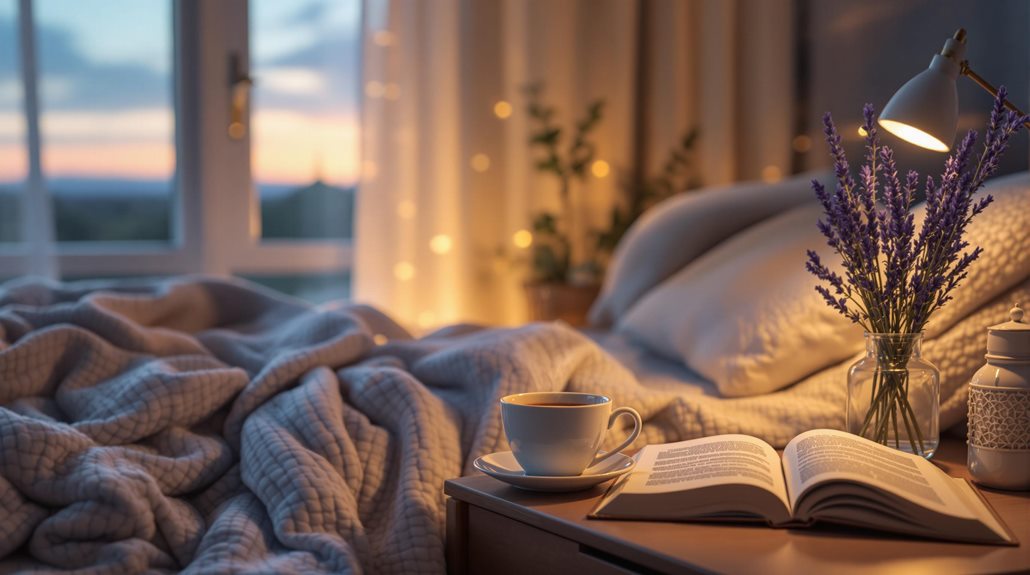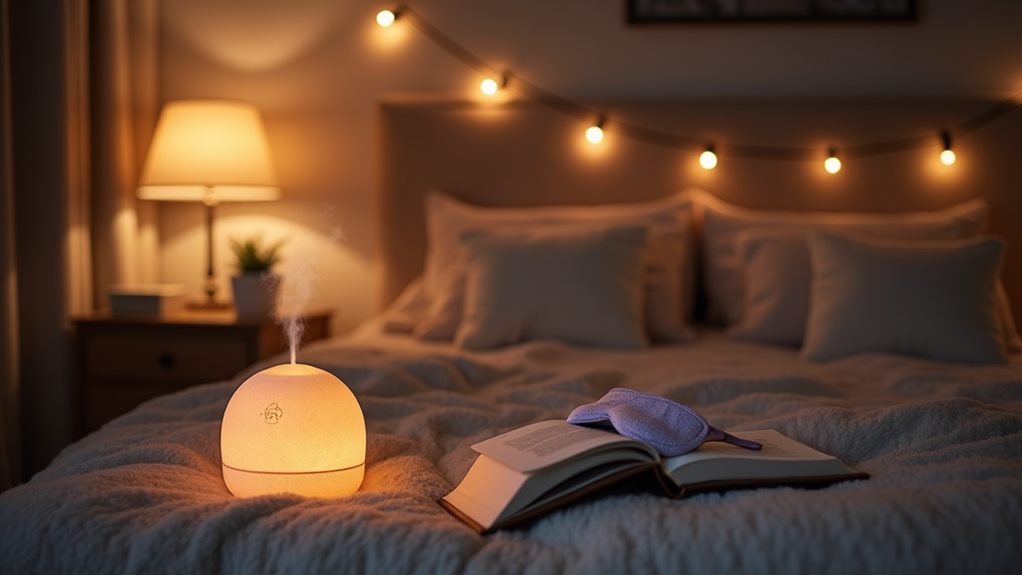
Transform your sleep by embracing these five bedtime routines. First, set a consistent sleep schedule to regulate your body clock and boost energy levels. Create a calming bedroom environment with cool temperatures and darkness that invites rest. Relax with soothing pre-sleep rituals like gentle yoga or meditation, avoiding heavy meals and screens before bed. Engage in evening wind-down activities to ease into sleep mode. Lastly, limit technology use to curb stimulating blue light and promote relaxation. These routines don’t just promise restful nights—they revolutionize how you approach sleep. Discover the secret to waking up refreshed and ready for the day ahead.
Consistent Sleep Schedule
Incorporating a consistent sleep schedule into your daily routine can be a game-changer when it comes to improving the quality of your sleep. By establishing a regular bedtime and wake-up time, you optimize your body’s natural sleep-wake cycle, supporting healthier sleep patterns. Forget about irregular sleep hours; sticking to the same schedule—even on weekends—trains your brain to know when it’s time to wind down. Regular exposure to natural light during the day can help reinforce your sleep-wake cycle as well. This practice not only reinforces your body’s internal clock but also enhances your overall sleep hygiene.
Dr. David Rosen emphasizes that dedicating 30 minutes to 2 hours to a structured bedtime routine can significantly improve your sleep quality. It’s about making gradual adjustments to your habits instead of drastic, unsustainable changes. As your sleep schedule stabilizes, you’ll likely notice a reduction in anxiety and depression symptoms. Consistency helps bolster your mental health, leaving you feeling more balanced.
Moreover, this newfound stability in sleep can boost your daytime energy and productivity. Imagine waking up refreshed and ready to tackle the day! Make bedtime a part of your nightly ritual, and you’ll likely see improvements in various aspects of your life. Don’t wait—start your consistent sleep schedule tonight!
Create a Calming Environment
Now that you have your sleep schedule in check, let’s turn your attention to creating a calming environment. Transform your bedroom into a sanctuary by setting the thermostat between 65 to 68 degrees Fahrenheit. This temperature range promotes optimal sleep comfort, allowing you to drift into a restful state with ease. Keeping the room well-hydrated can also contribute to the overall calming environment. Adequate hydration is essential for bodily functions, including sleep, as it supports energy levels and prevents fatigue. Declutter your space to foster a calming atmosphere. A tidy space can significantly reduce stress and invite relaxation, paving the way for better sleep. To reduce noise disturbances, consider swapping your TV for a white or pink noise machine. These devices can drown out background noise and have been linked to improved sleep quality.
Incorporate soothing scents into your bedtime routine through aromatherapy. Lavender, in particular, is excellent for enhancing relaxation and encouraging sleepiness. The pleasant aroma gently envelops your senses, inviting tranquility.
For a genuine tech-free zone, banish electronics from your bedroom. Devices emit blue light, which disrupts melatonin production—a hormone essential for falling asleep. Instead, use this area exclusively for rest and relaxation, ensuring it’s free from technological distractions. With these changes, you’re not just creating a room; you’re cultivating an oasis for rejuvenating sleep.
Relaxation Techniques

To kick-start your journey toward better sleep, you’ll often find that relaxation techniques are key to melting away the stresses of the day. Exercise, a natural stress reliever, can complement mindfulness meditation by managing physical and mental stress through increased norepinephrine levels. Practicing it regularly doesn’t just improve your sleep quality; it helps you embrace peaceful slumber quicker. Alongside this, deep breathing techniques slow your body down, enhance the transition to sleep, and bring a serene calm to your evening.
Progressive muscle relaxation involves tensing and relaxing muscle groups systematically. This simple yet effective strategy can significantly reduce physical tension and anxiety, paving the way for a restful night. Meanwhile, calming activities like gentle yoga or reading are perfect for smoothing out the rough edges of your day, preventing overstimulation, and facilitating winding-down.
Relaxing music is another wonderful addition to your routine. Allow its soft, soothing sounds to wash over you, easing emotional turmoil and distracting your mind from worries. Together, these relaxation techniques work in harmony, making quality sleep not just a dream but a nightly reality. By embracing these steps, you’re nurturing a more restful, restorative sleep each night.
Evening Wind-Down Activities
Picture yourself curling up with a good book, letting its pages whisk you away to another world—that’s one of the easiest evening wind-down activities you can embrace. By engaging in calming activities like fiction reading, you can significantly reduce stress levels and enjoy a smoother transition to sleep. To ensure you’re setting the stage for a good night’s rest, consider a consistent winding down period beginning 2-3 hours before bedtime. Here’s a simple checklist to improve relaxation and sleep quality:
- Dimming lights: Lower the lights in your home to signal to your body that it’s time to relax. This boosts melatonin production.
- Mindfulness practices: Try meditation or deep breathing techniques to alleviate anxiety and calm your mind.
- Limit screen time: Reduce your screen exposure—no phones, tablets, or TVs—at least an hour prior to bed to promote better rest.
- Gentle stretches or yoga: Incorporate these into your routine to relieve muscle tension and invite tranquility.
Mindful Technology Use

Ever notice how scrolling through your phone at night leaves you feeling wired instead of tired? That’s because blue light exposure from screens can disrupt your body’s ability to produce melatonin, a hormone crucial for initiating sleep. To enhance your bedtime routine every night, limit your screen time at least an hour before you hit the hay. If you must use devices, enable a red-light filter to mitigate some of that disruption.
Creating a tech-free zone in the bedroom can do wonders for crafting a calming environment that invites relaxation and sleep. Without the constant buzz of notifications, you’re free to engage in analog activities that ease your mind, like journaling or reading. These practices clear mental clutter and help prepare you for restful sleep.
Setting reminder alarms can also be a game-changer. Use them as cues to begin your bedtime routine, transitioning from the hectic pace of the day to a more mindful, sleep-focused state. Mindful technology use doesn’t have to be a buzzkill; instead, it sets the stage for a peaceful night by reducing stimuli and encouraging relaxation. Try it out and watch how your sleep improves.
Establish Consistency for Restful Nights
A harmonious bedtime routine is pivotal for achieving quality sleep, and establishing consistency is at the heart of this endeavor. By setting a regular bedtime and wake-up time, you engage your body’s internal clock, cultivating a rhythm that naturally promotes better sleep patterns and contributes to your overall well-being. The fundamental aspect of maintaining this cycle—through weekdays and weekends alike—eliminates morning grogginess and enhances restfulness.
Moreover, allowing yourself 30 minutes to 2 hours for a calming pre-sleep routine not only invites relaxation but also mentally prepares you for sleep. Gradual changes, such as a bedtime alarm that serves as a cue for winding down, enable these habits to seamlessly integrate into your daily schedule. This approach prevents overwhelming adjustments, fostering a sustainable pattern that ensures a steady stream of restful nights.
Altogether, by embracing these strategies, you’re effectively curating an environment and lifestyle that values sleep as a priority. This balanced approach not only lays the groundwork for sustained sleep quality but also elevates your physical and mental health. By consistently adhering to these bedtime rituals, you are investing in nights of restorative sleep and days filled with vitality and focus. Let the cycle of peaceful nights and energized days begin, transforming not just how you sleep, but how you live.














